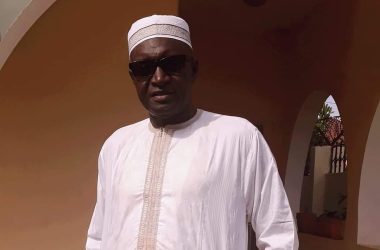
President Jammeh Must Stop Or Be Stopped From Making Empty Promises
Sarjo Bayang digs for evidence of any industrial policy on Gambia
(JollofNews) – All visible indicators are that poverty ranking of Gambia is on digital rise to worse scale.
President Yaya Jammeh still insists 20 years of his military rule is good. What you are about to read contains information on facts of Gambian reality that makes industrialisation nothing so readily feasible. Why the president will not surrender to let truth prevail is just amazing.
Development funds provided by international agencies are not agreed on making Gambia an industrial nation. Economic infrastructure and financial environment of Gambia are not enabling enough to support industrialisation.
Above all, Gambia only has trading policies to facilitate distribution of imported goods and very small scale business undertakings. For real good reasons Gambia does not have any policy on industrialisation.
Development partners are aware of the fact that without the enabling economic infrastructure and vibrant investment climate induced by healthy financial inducement there is no occasion talking about industrialisation as part of the national development agenda.
In short a nation without industrial policy and just relying on donor funds for poverty reduction cannot transform into superpower by wishful thinking. If President Yaya Jammeh is not thinking that Gambians are thick heads by constantly renewing a promise of superpower nation, then something is seriously wrong with him that needs immediate attention.
How can Yaya Jammeh sleep at night after knowing that all he tells Gambians about development into superpower nation of world class economic living standard is pure deception? He only made that dream possible over 20 years by lifting himself from abject poverty to filthy rich in money and material count just because he occupies the highest seat of political power; the presidency. That is exploitation and senseless greed tinged with corruption.
To let Jammeh carry on saying something even he does not believe is collective negligence on the part of every right thinking Gambian. As he strives to deceive by deliberate attempts so it must be seen right not letting him escape scrutiny with such fatal error of commission.
President Jammeh addressing school children renews his promise of making Gambia superpower
Most recently while addressing school children during celebration speech marking 20 years military rule here is what Jammeh said:
“The past two decades were not easy-pickings for the development of our motherland. From a retrogressive nation tethering on the brink of extinction, we have created a very dynamic modern country soon to become an economic super power.”
In the absence any industrial development policy how does a country with no enhanced productive sectors manage to soon become superpower nation of world class ranking? Evidence at hand tells the truth.
Gambia does not have industrial policy to be producer economy
The fact that Gambia government has Ministry of Trade, Industry and Economic Development does not make a good case for industrialisation. The government economic power house has since been renamed Ministry of Trade, Regional Integration and Employment. That change of name completely omitting industrial development is clear indication that such is not of immediate priority. Any talk about industrial development for Gambia will only serve to boost ego that things are good for nothing. Creating so called feel good effect in absence of the economic platform neither the engine of growth is classic demagogy and pure entertainment. 
For purpose of stimulating national dialogue on realistic development agenda of Gambia, this and other topical features articles in series are meant for public digest. Selected documents for reference only serve as teasers and anyone interested to expand the scope of enquiry will find more resources to validate or dispute claims about Gambia’s readiness to become industrial economy of world class superpower status as frequently promised by President Yaya Jammeh when he talks about Vision 2020 and recently (October 2014) while addressing school children in celebrating 20 years military coup he calls revolution. Certainly this is no industrial revolution for Gambia.
By keen observation, the Ministry of Trade (formerly Ministry of Trade, Industry and Employment – MOTIE) where this author once worked for Indigenous Business Advisory Services (IBAS) the trade policy under consideration has nothing on industrialisation. There must be reason for omission of Industrial Development at time of renaming this important government ministry best known to only the architects. The reader is warned that official documents are mostly inflated with jargons and high sounding words.
Ministry of Trade, Regional Integration and Employment, The Gambia Trade Policy 2011.
“Trade Promotion for Economic Development”
“The Gambia Trade Policy 2011 is a comprehensive policy document that seeks to improve the environment for trade by establishing transparent systems for exports and imports, provide trade infrastructure as well as articulate forward and backward linkages for trade facilitation.” http://www.gafspfund.org/sites/gafspfund.org/files/Documents/Attachment%2011%20The%20Gambia%20Trade%20Policy%202011.pdf
Are development agencies truly pro poor?
Outside impressive development partnership jargons reality is far different between pronouncements and promise of what is delivered. Distribution of international finance capital is more neatly on paper than what comes to door step of the poor for actual delivery.
Good part of funds projected in annual plans and budgets end up in deep pockets of agency employees as much goes to pay for office furniture in addition to mobility costs. From travel allowance to monthly incentive packages, everything is neatly tailored to keep agency workers improve their personal conditions with increasing poverty for people in whose names all the flights and big offices are kept going on.
Industrial development for Gambia is never mentioned by donor agencies
Two big names of development agencies familiar to most Gambians are United Nations Development Programme UNDP and International Monetary Fund IMF. When you take time to examine documentation by these named agencies on Gambia, industrial development does not feature in their agenda and almost hardly comes up in agreements signed.
Of course these agencies and others like them are not responsible for development of any nation. They only respond to demands of a nation and give out only much slice as allocated to each nation.
Needs are prioritised according to their urgency. For poor country like Gambia, becoming an industrial economy can only appear on a wish list but not of immediate development priority. Food on the table, improved health conditions, and poverty reduction will be placed on higher priority ranking. These go handy with fighting diseases; making health another priority along with basic food pr
oduction for survival motive.
It is therefore very much misleading for president of a poor country like Gambia to talk about industrialisation at such a pitch promising superpower world class standard of living knowing fully that is not part of any immediate development agenda. On the premises of how industrial development is not part of the agenda, reference to this IMF documentation about Gambia gives better idea.
Again the reader is warned that official documents are heavily loaded with high pitched jargons and technical expressions.
International Monetary Fund IMF Enhanced Structural Adjustment Facility Policy Framework Paper, 1998-2000
“1. Until mid-1993, The Gambia had made significant progress in reducing financial imbalances, liberalizing the economy, and strengthening the basis for durable economic growth. Under the Economic Recovery Program (1985) and the Program for Sustained Development (1990), strong policies and a broad range of economic reforms were put in place, including (1) a tight fiscal policy involving improved expenditure control and a broadening of the tax base; (2) a restrictive monetary policy; (3) the strengthening of economic incentives, including the lifting of most price controls and the introduction of a market-determined exchange rate in the context of a liberalized trade and payments system; and (4) the divestiture of a number of public enterprises and the strengthening of the financial position and operations of enterprises remaining in the public domain. The implementation of these policies was supported by the international community, in particular by the International Monetary Fund with a three-year arrangement under the Enhanced Structural Adjustment Facility (ESAF) that expired in November 1991, and by the World Bank through structural and sectoral lending, including the second structural adjustment loan (SAL II), which was completed in June 1992.”
“2. Since mid-1993, however, the Gambian economy has suffered from a series of adverse shocks, an unduly expansionary fiscal stance, increasing structural weaknesses, and diminished private sector confidence. Moreover, the military change of government in July 1994 prompted the suspension of new project aid and the cancellation of budgetary assistance by most of The Gambia’s traditional donors and creditors. Real GDP fell by 3½ percent in 1994/95 (July-June) and, although the economy recovered in 1995/96, economic growth has remained low since then. At the same time, the monetary authorities maintained a tight monetary policy, thereby containing inflation and preserving a large measure of exchange rate stability.”
https://www.imf.org/external/np/pfp/gambia/gam01.htm
Gambia is not producing surplus food and relies on imported rice
Food production has seen serious decline in recent years for Gambia. According expert assessment Gambia is to be declared crop failure for agriculture this year (2014). That will leave more hungry mouths to feed from food aid.
Apart from this year Gambia has not been good at producing agricultural surplus including food production. Due to acute poverty, agricultural activity is heavily along the line of cash crops for which peanut stands out the highest in volume.
One of the reasons why many Gambian farmers choose cash crop cultivation is so that they buy other food items and daily needs from proceeds of their yearlong farming. It does not always go well.
Farmers have no bargaining power for their crops. Profiteering traders take advantage of helpless farmers with throat-cutting price offers. During the farming season, food and other items are borrowed with hope of repaying during trade season. That leaves farmers with very little take-home pay at close of business. These farmers do not think of industrial production but live by hand-to-mouth, dawn to dusk.
No local source of industrial material
To kick-start industrial activity requires adequate supply of raw materials. Gambia does not produce such volume of raw materials for industrial processing.
There was one moment when Department of Agriculture introduced large scale cotton production. In the Southern province of Basse Upper River Division a cotton ginnery was set up for export purpose. After some years of operation, not even a word about this semi industrial unit is any longer heard of. That is perhaps the biggest industrial plant apart from peanut depots established for quality picking. Gambia does not have any textile industry apart from small weavers who spin some local cotton for homemade fabrics commonly known as “chossan” (traditional dress from woven cotton and imported thread)
Transforming Gambia into industrial nation will not be viable without adequate supply of raw material. Local sourcing will be more sustainable. Where raw materials are to be imported, cost of production will keep prices rising. For now, industrialisation is not part of Gambia’s national development agenda. Food supplies are running low and nobody talks about surplus under severe poverty conditions. Development partners know this and will not entertain government with any project proposal about industrial development. Fighting diseases and acute poverty are higher priorities as food supply runs fast. Even with imported food on stalls, cash flow is not healthy and distribution so imbalanced.
Trading in Gambia is purely by distribution
Like other poor nations around the globe what obtains for Gambia in terms of commerce and trade is all about distribution. The supplies range from used cars, second hand clothing, gadgets, foot ware, and variety of replicas.
In that distributive trading, importers make profits as local consumers spend. Not all the money generated from this distributive trade continues to be ploughed back for sustaining the Gambian economy. Capital flight takes various forms. One of the avenues is when those with no interest apart from exploiting the local economy deposit their proceeds in overseas banks.
Industrial development for Gambia is not feasible in long time from remote past to distance future. Anyone who cares to examine the economic reality and conduct proper health check of Gambia’s financial system knows far more than what can be explained in this article.
By all realistic evaluation Gambia certainly lacks elements of an industrial economy for world class status.
Reactions to this article can reach the author; a Management Consultant for Projects, Entrepreneurship, Economy, and Independent Evaluation by email: sbayang@hotmail.com




